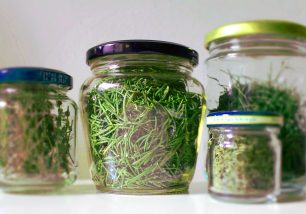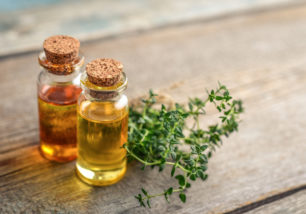BASIL ESSENTIAL OIL IN ALCHEMY
alchemyaromatic plantsessential oils
After analyzing more generally the essential oils linked to the 4 elements in alchemy, let’s get acquainted with some of them. August is the month of fire, and we had to begin with an essential oil linked to this element: Basil.
Basil essential oil is obtained from the Ocimum basilicum, a plant of the Lamiaceae family.
The name Basil comes from the Greek basilikon, from basileus which means king. Some interpretations believe it is called this because it was used to produce perfumes for the king.
In India, where it is considered a sacred plant dedicated to Vishnu and Krishna, it is called Tulsi and it’s used in Ayurvedic medicine to treat many ailments.
Among the ancient Egyptians, Basil had a symbolism linked to death. It was considered a good omen for the afterlife and it was used in embalming.
Even the Chinese people and Arabs knew its medicinal properties. The ancient Chinese culture considered it a kind of “medium plant” able to communicate with the spirit world.
At the time of the Greeks and Romans on the other hand, basil was not held in good respect. It was, in fact, a symbol of misfortune and hatred so much so that Pliny the Elder attributed to it the ability to generate states of sluggishness and madness, while according to Chrysippus, philosopher and mathematician of ancient Greece, it could be damaging to the stomach and the liver.
Ancient Romans associated it with the mythological figure of the basilisk, a snake-shaped creature capable of killing with its eyes. Basil would serve as an antidote to its poison.
An African legend claims that basil protects from scorpions while during the period of the Crusades, the ships were filled with it to repel insects and bad smells.
Known for its numerous properties, basil has a balancing action of the bacterial flora and the nervous system, as well as an effective anti-mosquito action. It is recommended in cases of mental fatigue, to combat anxiety, insomnia and stress. It has a decongestant, antiseptic, analgesic and digestive action.
Basil has a strong effect on the psyche. It encourages, strengthens, gives energy and it is an antidepressant. It is used against melancholy, fear, sadness, weakness of nerves and depression. It is utilized against migraines due to liver and bilious disorders. In inhalations and ointments, it is a good expectorant, even in the case of sinusitis. It is antispasmodic and anti-gaseous, very useful against hiccups and has a stimulating effect on the adrenal glands.
Because it aids menstruation, it should not be used during pregnancy.
As mentioned, it is linked to the fire element and in particular to Mars and the Sun, two archetypes related to strength and determination. Mars, god of war, is like an arrow, always ready to shoot. The Sun is our center, as it represents the heart.
During the Middle-Ages it was considered “the soul” of the garden, and the places where it grew abundantly were considered favorable to human health, as it was a sign of the beneficial forces emanating from the earth. Keeping it on the window sill of the house kept away evil spirits. Basil favors love, friendship and family harmony. Burning it in a room where there are people in disagreement helps to restore harmony. In addition to health and love, there is also a funerary aspect. In fact, it was planted on the graves of loved ones and when it bloomed, they brought the twigs home, where they thought could be found the spirit of their loved ones.
GIADA PAGIN e FRANCESCO URBANI
“Scuola dell’Essere Interiore”
Other articles that may interest you:
Aromatic water or floral waters: what are they?
 ESSENTIAL OILS: WELLNESS IN HOME
ESSENTIAL OILS: WELLNESS IN HOME THYME ESSENTIAL OIL: USES AND PROPERTIES
THYME ESSENTIAL OIL: USES AND PROPERTIES AROMATHERAPY: HOW TO CHOOSE AN ESSENTIAL OIL
AROMATHERAPY: HOW TO CHOOSE AN ESSENTIAL OIL HOW TO DISTILL MINT
HOW TO DISTILL MINT AROMATHERAPY: HISTORY
AROMATHERAPY: HISTORY POTATO CHIPS WITH ROSEMARY AROMATIC WATER
POTATO CHIPS WITH ROSEMARY AROMATIC WATER ROSEMARY ESSENTIAL OIL: CULTIVATION AND PRODUCTION
ROSEMARY ESSENTIAL OIL: CULTIVATION AND PRODUCTION HOW TO DISTILL ROSEMARY
HOW TO DISTILL ROSEMARY HOW TO DISTILL TANGERINE PEEL
HOW TO DISTILL TANGERINE PEEL NEEM OIL, FROM THE PLANT OF GOOD HEALTH
NEEM OIL, FROM THE PLANT OF GOOD HEALTH HERBAL TEAS, INFUSIONS AND DECOCTIONS: THE DIFFERENCES AND METHODS OF PREPARATION
HERBAL TEAS, INFUSIONS AND DECOCTIONS: THE DIFFERENCES AND METHODS OF PREPARATION HOW TO MAKE HOMEMADE ESSENTIAL OILS
HOW TO MAKE HOMEMADE ESSENTIAL OILS HEALTHY HAIR WITH AROMATIC PLANTS
HEALTHY HAIR WITH AROMATIC PLANTS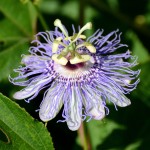 THE GOOD NIGHT PLANTS
THE GOOD NIGHT PLANTS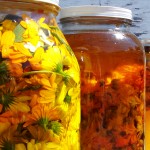 OLEOLITES: THE POWER OF HERBS IN OIL
OLEOLITES: THE POWER OF HERBS IN OIL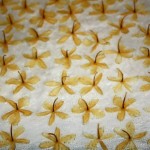 ENFLEURAGE: ANCIENT TECHNIQUE TO EXTRACT ESSENCES FROM FLOWER PETALS
ENFLEURAGE: ANCIENT TECHNIQUE TO EXTRACT ESSENCES FROM FLOWER PETALS ESSENTIAL OILS AND ECOLOGICAL DETERGENTS FOR HOUSE CLEANING
ESSENTIAL OILS AND ECOLOGICAL DETERGENTS FOR HOUSE CLEANING OIL FOR STRENGTHENING HAIR
OIL FOR STRENGTHENING HAIR SCENTED BAGS WITH DRIED HERBS AND ESSENTIAL OILS
SCENTED BAGS WITH DRIED HERBS AND ESSENTIAL OILS PURIFYING AND CLEANSING HERBAL TEAS DO-IT-YOURSELF
PURIFYING AND CLEANSING HERBAL TEAS DO-IT-YOURSELF LEMONGRASS: ESSENTIAL OIL TO FIGHT TUMORS
LEMONGRASS: ESSENTIAL OIL TO FIGHT TUMORS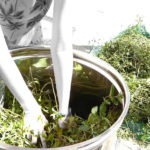 MINT ESSENTIAL OIL: CULTIVATION AND PRODUCTION
MINT ESSENTIAL OIL: CULTIVATION AND PRODUCTION CITRUS FRUITS AND ALZHEIMER’S DISEASE: NEW DISCOVERIES
CITRUS FRUITS AND ALZHEIMER’S DISEASE: NEW DISCOVERIES MINT ESSENTIAL OIL: USES AND PROPERTIES
MINT ESSENTIAL OIL: USES AND PROPERTIES
